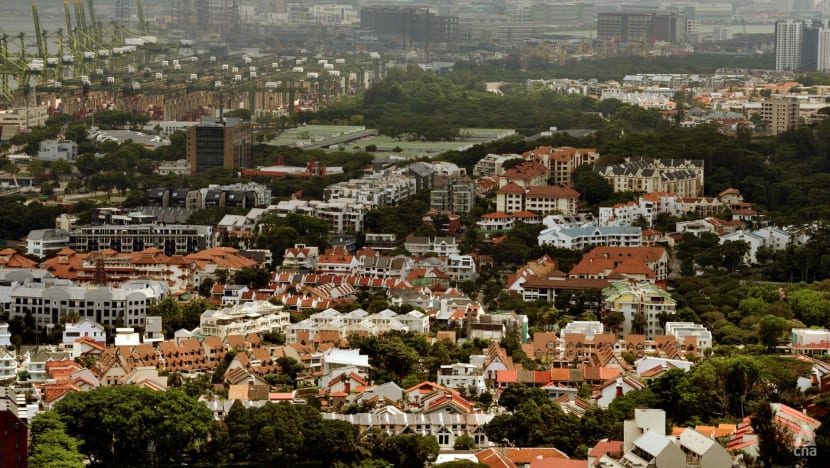Foreigners account for 'very small proportion' of private housing transactions in Singapore: Desmond Lee

File photo of private homes in Singapore. (Photo: CNA/Jeremy Long)
SINGAPORE: Foreigners account for "a very small proportion" of private housing transactions, Minister for National Development Desmond Lee said on Monday (Sep 12).
"In the past two years, they (foreigners) accounted for around 3 per cent of all private housing transactions," Mr Lee wrote in an answer to a parliamentary question by Non-Constituency Member of Parliament Leong Mun Wai (PSP).
"This is lower than the pre-pandemic level of around 5 per cent between 2017 and 2019."
Mr Leong asked Mr Lee if the inflow of foreign money into the local property market has increased in the last two years and, if so, whether such an inflow had pushed up private and public property prices.
He also asked if the Government intend to introduce new policies to manage the impact of the "flow of foreign money into the local property market".
In his answer, Mr Lee pointed out that foreigners are not allowed to buy Housing Board flats.
"While the foreigner share of private housing transactions remains low, the Government will continue monitoring foreign money inflows on our property market closely and adjust our policies as necessary, to promote a stable and sustainable property market," he said.
Private home prices rose by 3.5 per cent in the second quarter of 2022, according to statistics released by the Urban Redevelopment Authority (URA) in July.
This followed a 0.7 per cent increase in the first quarter of this year after the introduction of cooling measures in December 2021. Prices rose by 2.2 per cent in 2020 and 10.6 per cent in 2021.
According to an analysis in July from OrangeTee & Tie's senior vice president of research and analytics Christine Sun, purchases by foreign buyers rose in the second quarter of 2022 compared to the preceding quarter.
Based on URA Realis data, the number of non-landed homes excluding executive condominiums bought by foreigners or non-permanent residents rose by 102.8 per cent from 144 units in the first quarter of this year to 292 units in the second quarter, Ms Sun said.
The proportion of foreign purchases climbed from 3.1 per cent to 4.9 per cent over that same period, she added.
She said Singapore has emerged as a "top investment destination" given the geopolitical and economic uncertainties in other Asian countries.
MULTIPLE UNIT PURCHASES
In a separate reply on Monday. Mr Lee also addressed the subject of property buyers who purchase multiple units in the same development.
MP Yip Hon Weng (PAP-Yio Chu Kang) asked if the Ministry of National Development would consider introducing a higher tier of additional buyer's stamp duty (ABSD) for such buyers and if such purchases would negate or cushion the impact of previous ABSD increases.
He also asked about the circumstances under which the ministry would consider introducing curbs on bulk property purchases.
"Instances of property buyers who have purchased more than one unit in a single development are uncommon," Mr Lee said in his written reply.
"Among all private residential property units transacted so far this year, units involved in such multiple-unit purchases accounted for about 1 per cent. Units involved in multiple-unit purchases of more than two units are even lower, at about 0.2 per cent.
"Hence, bulk property purchases are unlikely to have a significant impact on the property market."
Mr Lee said that developments in the property market would be monitored closely, with policies adjusted as necessary to promote a stable and sustainable market.
He also highlighted that ABSD is structured to moderate investment demand in residential property and is differentiated based on the residency status of the buyer and the overall number of residential properties they own.
"ABSD discourages the purchase of multiple units, as higher rates generally apply to purchases by those who already own at least one residential property," he said, adding that higher rates also apply to buyers who are not Singaporeans.
In December last year, ABSD rates were raised across all buyer profiles except for Singaporeans and permanent residents buying their first residential property.

















